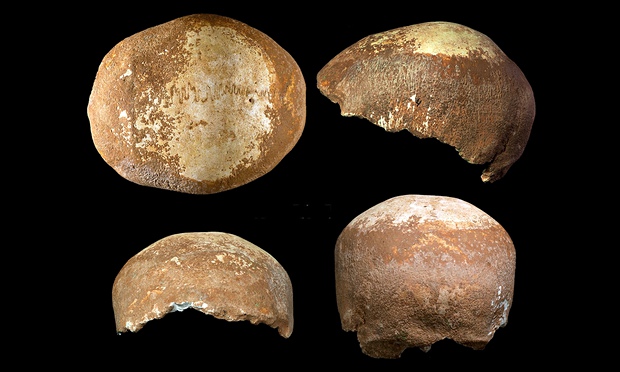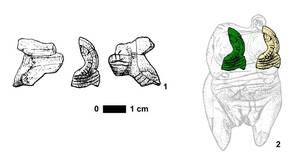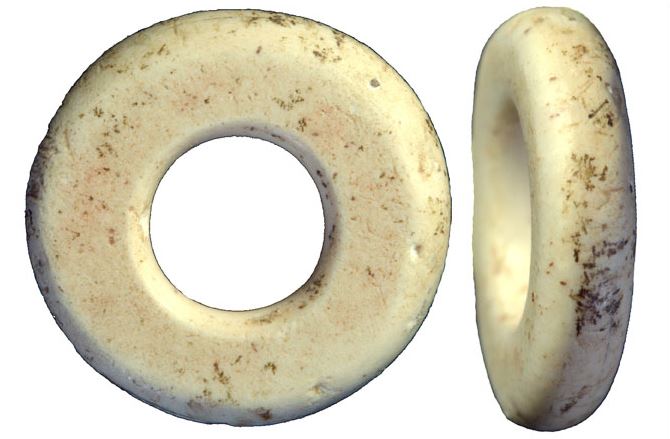Mythopoeika
I am a meat popsicle
- Joined
- Sep 18, 2001
- Messages
- 53,369
- Location
- Inside a starship, watching puny humans from afar
...So in the far future, men and women will be completely indistinguishable?
Human skull discovery in Israel proves humans lived side-by-side with Neanderthals
Steve Connor, Science Editor
Wednesday 28 January 2015
The partial skull of an anatomically modern human who lived alongside the Neanderthals about 55,000 years ago has been unearthed from a cave in northern Israel, scientists say.
It is one of the oldest non-African skulls of Homo sapiens and comes close to the date when modern humans migrated out of Africa, eventually to colonise Asia, Europe, Australia and the Americas.
Scientists unearthed the cranial fragments from Manot Cave in West Galilee, a prehistoric site with an impressive archaeological record of flint and bone artefacts. Dating has placed the skull within the period 50,000 to 60,000 years ago, a time when Neanderthals were also known to have inhabited the same region.

"Many of the genetic clusters we see in the west and north are similar to the tribal groupings and kingdoms around, and just after, the time of the Saxon invasion, suggesting these kingdoms maintained a regional identity for many years," he told BBC News.

More like yellow/pink/brown, semi-hairless, four-legged spiders.So were a bunch of manscaped chimpanzees?
All humans can reproduce freely, producing fertile offspring. If humans originated from different members of the genus Homo, if that's the theory, I wouldn't expect that. If it arose many times from a particular species, with a bit of interbreeding, I suppose that is possible. Still, it doesn't seem likely to me.
Presumably this theory has been proposed by someone. Who originated it?
G'day Pete, in the taxanomic kingdom, there are some species that can interbreed, and in the plant kingdom, they do frequently.
True, but, in animals, different species within a genus wouldn't usually have fertile offspring. However, I've had a chance to do a little reading on the mulitregional origins hypothesis since I posted my first response, and it seems clear it's not proposing that modern humans arose in isolation from one another (a notion I wouldn't give the time of day to) but that there was frequent interbreeding right through. So, I'm comfortable with that. I haven't seen a solution to the problem of greater genetic diversity in Africans, though.G'day Pete, in the taxanomic kingdom, there are some species that can interbreed, and in the plant kingdom, they do frequently. Science, at one time, said that Neanderthal couldn't breed with Homo sapien - they now say that it did happen.
True, but, in animals, different species within a genus wouldn't usually have fertile offspring. However, I've had a chance to do a little reading on the mulitregional origins hypothesis since I posted my first response, and it seems clear it's not proposing that modern humans arose in isolation from one another (a notion I wouldn't give the time of day to) but that there was frequent interbreeding right through. So, I'm comfortable with that. I haven't seen a solution to the problem of greater genetic diversity in Africans, though.
Interesting discussion. I can't see how there's any doubt about this proposition. I think during the era we're looking at hominid species couldn't have looked as distinct as say Homo-ss does from orangs today. You'd have had your robusts and your graciles with height variability, but they'd have mostly had more in common than they had in variance. The males of all hominid species (known and unknown) would therefore have been f*cking anything they could hold down that looked relative to their form (and smelled female). Do we assume this was the case over waves of geographical co-location in the hundreds of thousands of years that led to the emergence of homo-ss? Almost anything could have happened breed-wise to produce the modern species as we are now. As the tree continues to complexify with successive hominid discoveries the genetic line will expand. So I guess I'm with the convergence crowd on this.... there was frequent interbreeding right through...
First ancient African genome solves migration mystery
By Rebecca Morelle Science Correspondent, BBC News
An ancient African genome has been sequenced for the first time.
Researchers extracted DNA from a 4,500-year-old skull that was discovered in the highlands of Ethiopia.
A comparison with genetic material from today's Africans reveals how our ancient ancestors mixed and moved around the continents.
The findings, published in the journal Science, suggests that about 3,000 years ago there was a huge wave of migration from Eurasia into Africa.
This has left a genetic legacy, and the scientists believe up to 25% of the DNA of modern Africans can be traced back to this event.
"Every single population for which we have data in Africa has a sizeable component of Eurasian ancestry," said Dr Andrea Manica, from the University of Cambridge, who carried out the research.
Ancient genomes have been sequenced from around the world, but Africa has proved difficult because hot and humid conditions can destroy fragile DNA.
However, the 4,500-year-old remains of this hunter gatherer, known as Mota man, were found in a cave and were well preserved.
Importantly, a bone that is situated just below the ear, called the petrous, was intact.
Dr Manica, speaking to Science in Action on the BBC World Service, said: "The petrous bone is really hard and does a really good job of preventing bacteria getting in and degrading this DNA.
"What we were able to get is some very high quality undamaged DNA from which we could reconstruct the whole genome of the individual.
"We have the complete blueprint, every single gene, every single bit of information that made this individual that lived 4,500 years ago in Ethiopia."
The genome revealed that Mota man had purely African DNA, his ancestors had never moved from Africa.
But the comparison of this with modern African genomes highlighted that about 1,500 years after his death, the make-up of the continent had changed.
Genetic studies have shown that after the great migration out of Africa, which happened about 60,000 years ago, some people later returned to the continent.
But this study shows that about 3,000 years ago there was a much larger migration than had been thought.
The Neolithic farmers from western Eurasia who, about 8,000 years ago, brought agriculture to Europe then began to return to Africa.
"We know now that they probably corresponded to a quarter of the people that already lived in East Africa (at that time). It was a major backflow, a very sizeable movement of people," said Dr Manica.
It is unclear what caused this move - potentially changes happening in the Egyptian empire - but it has left a genetic legacy.
"Quite remarkably, we see in Ethiopia about 20% - so a fifth - of the genome of people living there right now is actually of Eurasian origin, it actually comes from these farmers," explained Dr Manica.
"But it goes further than that, because if you go to the corners of Africa, all the way to West Africa or South Africa, even populations that we really thought were purely African have 5-6% of their genome that dates back to these western Eurasian farmers."
etc...
http://www.bbc.co.uk/news/science-environment-34479905
Maybe not if the new immigrants came from eastern parts, towards Asia, rather than the northern parts of Europe.If true, it does make it seem weird that sub-saharan populations are lacking in neanderthal genome. Shouldn't that have been brought in by these immigrants?
If true, it does make it seem weird that sub-saharan populations are lacking in neanderthal genome. Shouldn't that have been brought in by these immigrants?
Maybe not if the new immigrants came from eastern parts, towards Asia, rather than the northern parts of Europe.
Depressingly, I have read and seen much that does tend towards this interpretation. Not just in respect of that particular company, but regarding the entire industry: that's at least in part because it's based upon some very-shaky paradigms.and really, is this just a money making con, considering the lack of explanation in the replies I received from ancestory.com?
Looking at genetics, some scientists claim that they hsve found evidence for another, earlier migration out of Africa. Though they say that first wave had little genetic influence.
http://www.bbc.com/news/science-environment-37408014
DNA research finds the world's oldest civilization
New research just revealed shows the world's oldest civilization belongs to the indigenous populations of Australia and Papua New Guinea. ...
That seems a very liberal use of the word Civilization.

